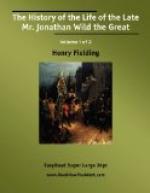No, I cannot agree with Professor Saintsbury that “Fielding has written no greater book” than Jonathan Wild. It was unquestionably the most important part of the Miscellanies of 1743. Its brilliancy may make it outrank even that delightful Journal of the Voyage to Lisbon. A higher place should not be claimed for it. Mr. Dobson, in his Henry Fielding, has assigned the right position to Jonathan Wild when he says that its place “in Fielding’s works is immediately after his three great novels, and this is more by reason of its subject than its workmanship,” which if not perfect, is yet for the most part excellent.
G. H. Maynadier.
THE LIFE OF THE LATE
MR. JONATHAN WILD
BOOK I
CHAPTER ONE
SHEWING the wholesome uses drawn from recording the achievements of those wonderful productions of nature called great men.
As it is necessary that all great and surprising events, the designs of which are laid, conducted, and brought to perfection by the utmost force of human invention and art, should be produced by great and eminent men, so the lives of such may be justly and properly styled the quintessence of history. In these, when delivered to us by sensible writers, we are not only most agreeably entertained, but most usefully instructed; for, besides the attaining hence a consummate knowledge of human nature in general; of its secret springs, various windings, and perplexed mazes; we have here before our eyes lively examples of whatever is amiable or detestable, worthy of admiration or abhorrence, and are consequently taught, in a manner infinitely more effectual than by precept, what we are eagerly to imitate or carefully to avoid.
But besides the two obvious advantages of surveying, as it were in a picture, the true beauty of virtue and deformity of vice, we may moreover learn from Plutarch, Nepos, Suetonius, and other biographers, this useful lesson, not too hastily, nor in the gross, to bestow either our praise or censure; since we shall often find such a mixture of good and evil in the same character that it may require a very accurate judgment and a very elaborate inquiry to determine on which side the balance turns, for though we sometimes meet with an Aristides or a Brutus, a Lysander or a Nero, yet far the greater number are of the mixt kind, neither totally good nor bad; their greatest virtues being obscured and allayed by their vices, and those again softened and coloured over by their virtues.




